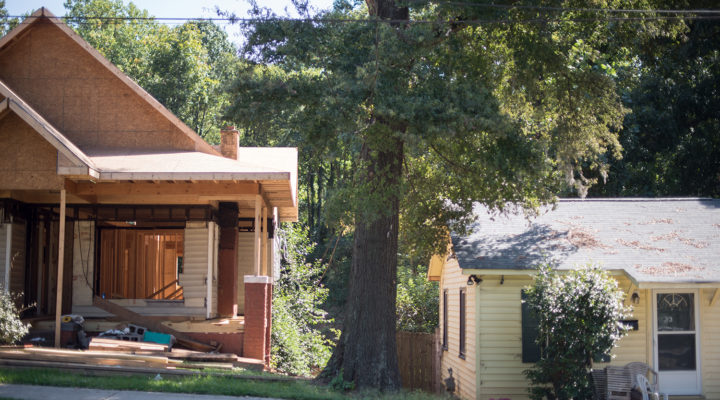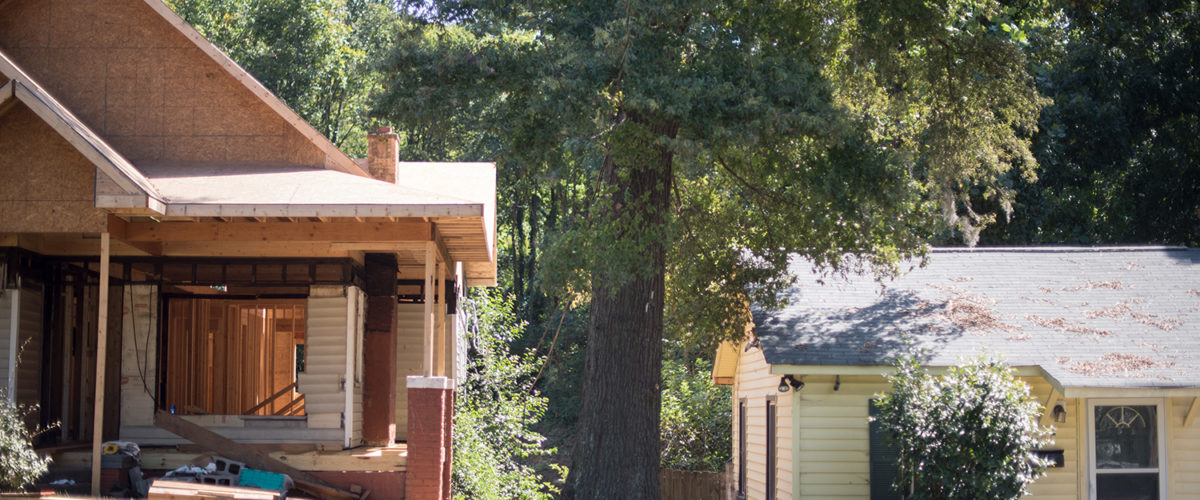Enderly Park is blistering under an unseasonable September heat, and Frank Byers saunters across Tuckaseegee Road to the rec center where he likes to play cards with his neighbors.
He doesn’t use the crosswalk, but in many ways he’s earned it, that and another cigarette. Then he’s ready to talk football.
The Carolina Panthers’ veteran tight end Greg Olsen broke his foot during Sunday’s game, but Cam and the boys beat the Bills, and that’s fine by Frank.
“I’m my own team lover and I’m not riding the bandwagon no more; I’m a hometown diehard,” Byers says.
Despite some years rooting for the Steelers — one of the many bad habits Byers has sworn off — his devotion to the Queen City runs deep. Decades before he settled on the West Side of Charlotte, Byers grew up in Dilworth, the city’s first streetcar suburb, just two miles south of the city center. Yet, even as Dilworth dodged the 1970s urban renewal project, which disrupted many historically black neighborhoods, young Baby Boomers later crept in seeking in-town location and older houses. Rents skyrocketed and Byers had to leave. But hip, young families soon sniffed him out at his new home in Wilmore. Rents went up, again, and Byers had to leave — again.
From his new apartment in Enderly Park, owned and leased affordably by the QC Family Tree intentional Christian community, Byers is once more on a collision course with gentrification. But this time, he’s not alone. For the past decade, Frank has been engaged in the life and work of QC Family Tree and its directors, Greg and Helms Jarrell, together being authentic neighbors in Enderly Park and seeking justice with a community marked by stunning strength yet crippling disinvestment. And as the smell of hops wafts from the Lucky Dog Bark & Brew down the street, Byers and QC Family Tree are enlisting their neighborhood and other willing allies in a fight against the forces that put profit above people and exercise economic supremacy over Charlotte’s vulnerable.
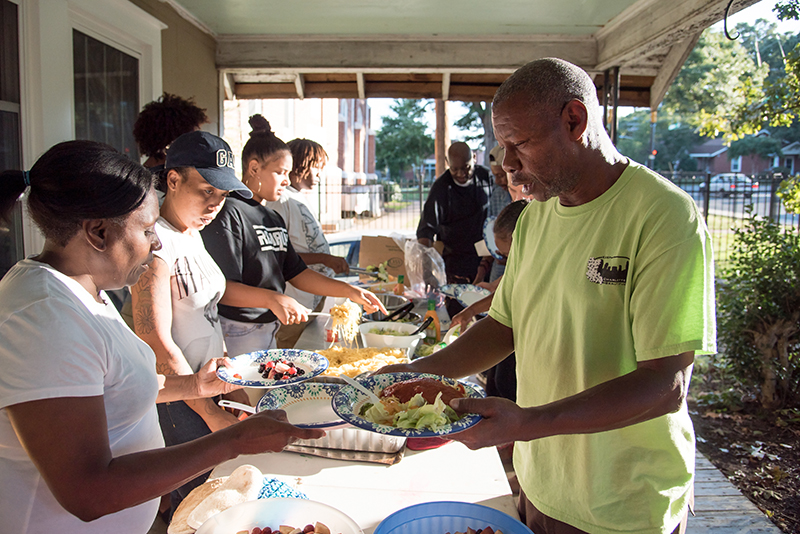
Frank Byers, leader with QC Family Tree and chair of the West Side Community Land Trust, prepares plates at a community meal in Enderly Park. (Photo/Lesley-Ann Hix Tommey)
Yet, as Byers works alongside QC Family Tree to defend his community from displacement, even serving on the board of the emerging West Side Community Land Trust, Byers says he isn’t angry. He doesn’t speak of justice, but only of his family and an enduring love for his city.
“I’m living in a city that’s hungry for some kind of championship,” Byers says.
While the neon-blue panther on Byers’ ball cap sufficiently attests to his meaning, you can’t help but imagine that he isn’t just talking about Charlotte’s Super Bowl hopefuls. Byers says he simply wants to stay in the neighborhood he loves and keep his son, Frank Jr., in the same school until he graduates. The hometown diehard, on the run from gentrification his whole life, is standing with his Enderly Park family, and they are hungry for a win.
“Racism is a system that removes people from land and land from people,” says Greg Jarrell, co-director of the QC Family Tree intentional community, which has been cultivating solidarity with Enderly Park residents like Byers for more than 12 years.
“The story of race is a story in which people who look like me — white people — control and profit from land, and remove the ability of people of color to be grounded in the earth. That’s what colonialism is all about, who’s in charge of the land. Gentrification is the new way of settler colonialism. It removes the people who have lived on that land, sometimes for generations, and it’s the natural progression of late capitalism and the roots of it go way back. What does racism look like in this community? Right now, the instability of people’s housing.”
When the Jarrells first moved to Enderly Park in 2005, however, seeking justice did not yet mean practicing community development in an effort to heal broken places, Greg says. In fact, he believes the prerequisite to seeking justice with their neighbors means constantly indicting their own privilege and tendency to exercise supremacy through compassion. Effectively, justice meant siding with their neighbors, even when siding did not mean helping, and the Jarrells went about designing ways to do so.
“Racism is a system that removes people from land and land from people.”
In addition to gathering the neighborhood’s youth for basketball tournaments, movie nights and meals at their house on Parkway Avenue, the Jarrells established monthly community meals to which anybody in the neighborhood was invited and for which ordinary residents became servers. As natural skepticism fell and relationships deepened, community meals began to play a central role in how neighbors listened to each other and identified ways of organizing around places of injustice. If a local family faced impending eviction, the community responded. If a teenager became a flight risk, they responded.
Gradually, Greg says, family after family fell victim to rising property value and increasing development in the neighborhood. “Just like in most cities across the country, housing has become very expensive and this neighborhood has seen a doubling of housing prices in the last 18 months.”
“Extreme disinvestment in this neighborhood over the past 40 years has created an environment where poor people lived here for a long time, often in bad conditions that most folks would not want to live in,” continued Greg. “But the people who have lived here made the absolute best of it that they could and did a tremendous job. Now, the people still on the deeds, whose names are on the papers downtown but who haven’t invested any money for decades, are positioned to make large profits off of that disinvestment. That harms our neighbors, the large majority of whom don’t own their houses. So when the rent goes up, they just have to leave.”
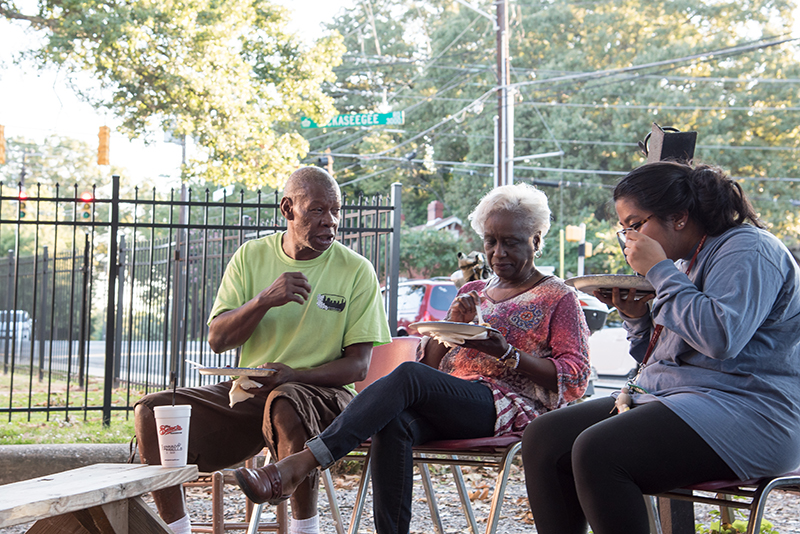
As gentrification threatens Enderly Park residents with displacement, QC Family Tree is mobilizing their neighbors to create sustainable housing solutions in West Charlotte and corporate meals have become a jumping-off point. (Photo/Lesley-Ann Hix Tommey)
As QC Family Tree and neighbors like Byers began to organize against displacement, they quickly learned that North Carolina tenant-landlord law strongly favors landlords. Without ownership of land, Greg says, a given resident has very little recourse.
Byers discovered that precedent firsthand in 2016 when the landlord who rented his first apartment in Enderly Park suddenly sold the building for profit without notifying him. Overnight and without any improvements to the apartment, Byers’ rent rose from $600 a month to $900, leaving him no option but to turn to his neighbors at QC Family Tree, which owns five apartments that were gifted by a local landlord. Through a Section 8 voucher — a program, Greg explains, that has a highly stabilizing effect on housing but that has stalled by more than two years in the Charlotte area — Byers began renting from QC Family Tree at a price commensurate with his income.
For now, Byers helps his 12-year-old son get ready for school and prepare for his first season playing football in a rent-stable apartment, where Frank Jr. can attend the school he loves. Since getting clean from drug addiction and joining the work of QC Family Tree, life has never been so good, Byers says, and he wants to engage in the kind of advocacy that helped him find wholeness along the way.
“I’m seeing them help people, and that’s what I’ve been prone to do — help somebody else because somebody helped me over the years.”
“I’m seeing them help people, and that’s what I’ve been prone to do — help somebody else because somebody helped me over the years.”
“So we’re forming an organization to help people with affordable housing, people that live here and want to stay here in the 28208 zip code. We want to have them somewhere to live that’s affordable. This organization will have some property for you to live. We started last year in October and I’ve seen a lot of people come together.”
That organization, called the West Side Community Land Trust, is the latest expression of QC Family Tree’s journey toward justice. With Byers as chair of the board, WSCLT is comprised of the Jarrells, local West Side residents and other investors, Greg says, who want to see housing stabilize in West Charlotte and don’t feel the need to profit from investing in that mission. Through grassroots organizing and the building of a stakeholder pool, community land trusts effectively seek the legal recourse of land ownership, which, once attained, gives the group the ability to hold rents at sustainable and affordable levels for low-income residents.
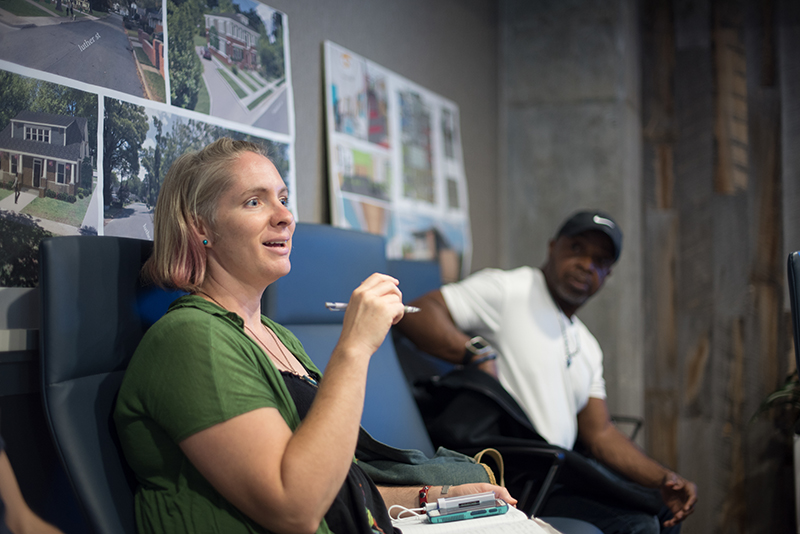
Partnered with local investors and community leaders, the Jarrells are spearheading a movement to create stable housing for low-income residents in West Charlotte as gentrification threatens their housing. Helms Jarrell convenes a board meeting of the West Side Community Land Trust. (Photo/Lesley-Ann Hix Tommey)
With a median household income of $20,000 — more than $30,000 less than the median white household income — black residents of Enderly Park must have affordable housing to remain in their neighborhood and resist being displaced beyond the interstate where transportation and infrastructure provide even fewer opportunities, Helms Jarrell says. That’s why WSCLT is focused on educating local residents to resist lucrative offers on their property and lobbying for the funding necessary to purchase land in the 28208, 28214, 28216 and 28217 zip codes. As property value rises by the minute, Helms says, QC Family Tree often wonders if justice is possible, even in light of a God who seeks justice alongside them.
“I’ve been thinking about whether justice is possible and I don’t think it is right now.”
“When we think about the narrative of Israel’s departure from Egypt, they get out of Egypt but they’re still not in the Promised Land for another 40 years, wandering around in the wilderness. So it seems that there is a way toward justice. There is a practice that can be worked out to move us in the direction of justice, but I don’t know if we’re ever going to get there. The best I feel like we can do right now is to try and practice and work at it, and stretch into ways of abundant living, neighborliness, co-creation, resiliency, mirroring self-determination, being able to listen to the power of the voices of people who have been oppressed.”
After an entire day’s work is done and the babysitters have arrived, Helms Jarrell makes her way through Enderly Park to the WSCLT monthly meeting. En route, pristine craftsman bungalows dot the landscape, intermingled with the weathered homes of generations of resilient families. Once at the board table, she convenes the hopeful few in devising ways to be better neighbors and to defend their community’s right to remain in their homes. This quarter, they will focus on partnering with local investment initiatives and participating in a “Take Back the Block” demonstration, all the while building their membership $5, $20 and even $1,000 at a time through their fundraising website (squareup.com/store/westsideclt).
Yet, Helms explains, the end means nothing if the means reflect the same supremacy that now threatens their loved ones. For QC Family Tree, the work itself must be marked by a relinquishing of privilege and a sharing of mutual leadership and care. That’s why QC Family Tree and WSCLT safeguards their work by placing long-time Enderly Park residents like Frank Byers on governing boards and executive posts as well as continuing to host their neighbors for warm meals and careful listening. Ultimately, Helms says, housing justice is not an abstract issue — it lives and breathes, loves and fears, and desires a real peace.
“I don’t think of us doing the work of justice. I’m not a justice hero,” Helms says.
“It’s not abstract. Housing doesn’t just come down and hit us. It’s completely fluid, organic and relational. It means trying to listen and discern; what are the things going on and how can I respond with my gifts? We’re always wondering, ‘Did I do it right? Am I still doing it right? What is right? Should I even be worried about being right?’ I don’t know where justice lies, but I feel like I’m best practicing it when I have immersed myself in a community where I know God exists, because God resides with those who are marginalized and oppressed.”
Read more in the QC Family Tree Series
Video: What does justice look like in Enderly Park?
Video: How is QC Family Tree seeking justice in Enderly Park?
Video: What do you love about Enderly Park?
Video: How is QC Family Tree on the path toward justice?
Video: Why are you fighting for stable housing in West Charlotte?
Photo Gallery: QC Family Tree in photos
Related commentary at baptistnews.com:
Requiem for the ‘cut’: Finding connections in a gentrifying neighborhood | Greg Jarrell
Where to go from here: Re-imagining Charlotte | Greg Jarrell
Greg Jarrell is a regular contributor to BNG opinion. Read more in his column.
Related news at baptistnews.com:
Marginalized are harder to see ― and help ― in tourist towns, ministers say
Related curated at baptistnews.com:
Church makes scripture-centered fight against neighborhood displacement the core of its mission
Church planting and the gospel of gentrification
QC Family Tree, founded by Greg and Helms Jarrell, is an intentional Christian community forming relationships and seeking justice alongside residents of the Enderly Park neighborhood of Charlotte, N.C. This series in the “Faith & Justice” project is part of the BNG Storytelling Projects initiative. In “Faith & Justice,” we tell the stories of the people and organizations that are helping to bend the “arc of moral justice” towards justice and who are transforming communities. Additional series on this topic include Charleston: Metanoia with Bill Stanfield.
_____________
Seed money to launch our Storytelling Projects initiative and our initial series of projects has been provided through generous grants from the Christ Is Our Salvation Foundation and the Eula Mae and John Baugh Foundation. For information about underwriting opportunities for Storytelling Projects, contact David Wilkinson, BNG’s executive director and publisher, at [email protected] or 336.865.2688.

